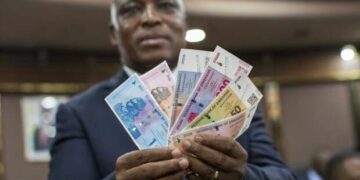Despite the lingering controversies surrounding its establishment of Agyapa Royalties as a vehicle through which to monetize Ghana’s gold mining royalties, government is going ahead with its plans to float the company on the London Stock Exchange and the Ghana Stock Exchange before the end of this year.
To this end, road shows are being planned in Europe and North America to convince major institutional investors to buy the company’s shares when the Initial Public Offer on the LSE opens, expectedly over the next couple of months.
Government’s hurry to complete the IPO before the end of this year is based on three key factors.
One is that the major opposition party, the National Democratic Congress has openly warned that if it wins this year’s general elections it will scrap the entire initiative.
Therefore government wants to deliver a fait accompli before any possible hand over of power. Instructively, Agyapa has been established with clauses that ensure long term contracts for Ghana’s representation on its Board and management, to minimize the potential for changes in the event of the incumbent administration losing power in the future.
The second is that government desperately needs the US$500 million it hopes to raise through the IPO. Already, the impacts of COVID 19, which were totally unanticipated at the time the 2020 budget was put together, have more than doubled the size of this year’s fiscal deficit from the original 4.7 per cent of Gross Domestic Product to 11.4 per cent, and spending pressures on government from certain interest groups within the electorate are likely to expand the deficit even further.
An example of this is the substitution of GHc3.5 billion in zero interest, five year bonds, issued to depositors of liquidated financial intermediation companies with immediate cash payments.
Although the proceeds of the impending IPO are meant to be spent only on commercially viable projects in the gold industry, it still means that some US$2.5 billion will become available, part of which will go into economic infrastructure in that industry at a time that capital expenditure in general is being crowded out of the public spending profile.
The third reason for government’s hurry is that the gold industry is currently enjoying an unprecedented surge in performance due to record high gold prices on international markets, which are now close to US$2,000 per ounce.
Instructively, Finance Minister Ken Ofori-Atta has revealed that Agyapa will invest heavily in gold funds, since these are doing better now than ever before.
With economies globally being confronted with uncertainties related to the coronavirus pandemic and central banks introducing stimulus packages and cutting interest rates, gold-backed exchange traded funds (ETFs) had seen seven consecutive months of positive flows as of June.
This presents the government of Ghana the best window of opportunity to launch Agyapa Royalty, since global net inflows into Gold-Backed ETFs were US$39.5 billion in the first half of this year, according to the World Gold Council.
The net inflows for the first half of 2020 already exceed the record set for highest annual inflows set in 2016 of US$23 billion. In terms of tonnage, in just six months it beat the previous full year record of 646 tonnes in 2009 by almost 100 tonnes.
Demand in the first half of 2020 significantly exceeded multi-decade record levels of net gold purchased by central banks in 2018 and 2019.
Available data indicates that the big three gold royalty companies —Wheaton Precious Metals, Franco-Nevada and Royal Gold— in the first quarter of 2020, alone collectively generated a remarkable US$402 million in positive free cash flow.
Rising investor appetite for gold is also being reflected in the fact that assets under management (AUM) in global gold-backed ETFs reached a new record high in April, according to World Gold Council (WGC) data.
All this means that Agyapa will be a very attractive proposition at this time, more so since government is valuing the company quite cheaply considering the underlying cash flows guaranteed from royalties payments.
After the initial fierce opposition it faced with regards to its strategy for monetizing royalties using Agyapa, government is now working on the quiet towards launching the IPO, so as to avoid igniting further controversy, but the requisite work is going on quickly.
Nevertheless government is still engaged in a race against time that will be a close call.
Its task will be made all the more complicated by the closer than usual scrutiny expected by the LSE which has been monitoring the controversies in Ghana over suspected plans for malfeasance with regards to corporate governance.








